Pieta Blu-ray Movie
HomePieta Blu-ray Movie 
피에타 / Blu-ray + Digital CopyImage Entertainment | 2012 | 104 min | Not rated | Jul 23, 2013
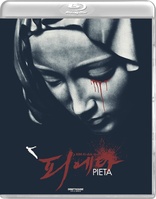
Movie rating
6.9 | / 10 |
Blu-ray rating
| Users | 0.0 | |
| Reviewer | 3.0 | |
| Overall | 3.0 |
Overview
Pieta (2012)
A brutal man in the employ of a loan shark is forced to reconsider his violent lifestyle when a mysterious woman appears claiming to be his long-lost mother. But, as his attachment to her grows, he begins to discover the gruesome and tragic secret that made her seek him out.
Starring: Jeong-jin Lee, Jo Min-soo, Ki-Hong Woo, Eunjin Kang, Kwon YulDirector: Kim Ki-duk
| Foreign | 100% |
| Drama | 41% |
| Crime | Insignificant |
Specifications
Video
Video codec: MPEG-4 AVC
Video resolution: 1080p
Aspect ratio: 1.85:1
Original aspect ratio: 1.85:1
Audio
Korean: DTS-HD Master Audio 5.1
Korean: Dolby Digital 5.1
Subtitles
English
Discs
25GB Blu-ray Disc
Single disc (1 BD)
Digital copy (as download)
Playback
Region A (C untested)
Review
Rating summary
| Movie | 2.5 | |
| Video | 4.0 | |
| Audio | 4.0 | |
| Extras | 3.0 | |
| Overall | 3.0 |
Pieta Blu-ray Movie Review
The Quality of Mercy Droppeth like a Reign of Fire
Reviewed by Michael Reuben July 26, 2013Pieta has elements of a horror film, a thriller and a film noir, but it is none of those things. Making his eighteenth film in a career that has brought him greater acclaim and notoriety abroad than at home, director Kim Ki-duk consciously sought to craft a more popular work, but he remains preoccupied with the same themes of guilt, expiation and redemption that have animated many of his previous films, often through suggestive visuals and allusive, even cryptic narratives. Kim's initial inspiration for Pieta was a viewing of Michelangelo's statue of the same name, which is perhaps the most famous artistic expression of the medieval theme of the Pietŕ or "Lamentation of Christ", in which the Virgin Mary cradles the dead body of Jesus. Kim has said that for him Michelangelo's statue expresses the sorrow of the world, and apparently that is the effect for which he was aiming in his film—or at least the sorrow of the modern capitalist world as Kim perceives it in South Korea. Unfortunately, Kim's ambitious message is too weighty for the slender plot on which he has chosen to rest it, and the story collapses under the weight of everything Kim has piled onto it. Kim's gifts as a visual artist remain undiminished, and Pieta contains numerous striking images. The film won the Golden Lion Award at the 2012 Venice Film Festival and has been critically well received, which makes mine a minority opinion. As much as I have liked other work by Kim (though I don't claim to be an expert), and as hard I tried to like Pieta, I found it emotionally inert and intellectually vapid.
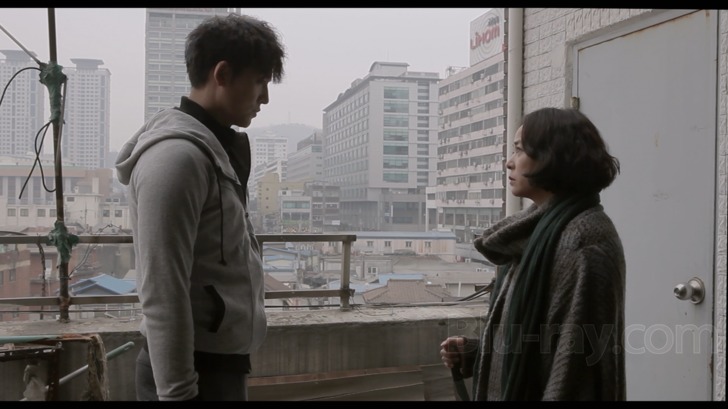
Although other characters appear in the film, Pieta is essentially a two-person drama about Lee Gang-do (Lee Jung-sin), a sadistic debt collector for loan sharks, and Jang Mi-son (Cho Min-soo), the mysterious woman who appears one day claiming to be the mother who abandoned him at birth. The story is that of the unlikely relationship that develops between these two, and the mystery is why Mi-son has suddenly decided, after thirty years, to seek out Gang-do and beg his forgiveness. The age of thirty has not been randomly chosen, because it is the age at which, by general consensus and the Gospel According to Luke, Jesus began his ministry. However, despite his age, the title and the many tears shed by the mother figure, Mi-son, Gang-do is a Christ figure only in the most abstract and metaphorical sense. He has no feelings for others (though he does have feelings), and his methods of debt collection are so grimly barbaric that even his employer finds them too extreme. Gang-do lives and works in the district of Seoul known as Cheonggyecheon, an increasingly barren and deteriorating industrial sector of abandoned metal and machine shops for which legitimate work is scarce. The desperate people who remain borrow from Gang-do's syndicate at exorbitant rates, signing insurance policies as collateral. When they cannot pay (and they never can), they are obliged to maim themselves so that the policy pays their debt. Death is not allowed. As Gang-do repeatedly explains, death "complicates" the policy. But many of Gang-do's "clients", who can no longer work after satisfying their debt through self-mutilation (or, if they are faint of heart, being helped along by Gang-do), commit suicide rather than live with their condition. One such suicide opens the film. A tall, strapping ruffian, Gang-do does not hesitate to slap around borrowers in front of their spouses or parents. He believes that people should not borrow money unless they are prepared to accept the consequences and, deep down, he holds his customers in contempt. At home, he is isolated and a loner, his love life limited to masturbation. Then Mi-son appears and, without explanation, begins washing dishes, trying to keep house and generally behaving maternally. Gang-do is initially furious, cursing this strange woman, slapping and pushing her away, eventually molesting her and even attempting rape, as he rejects her efforts to forge a connection. These scenes are played with intense conviction by the two leads, and they are painful to watch. Eventually, though, Mi-son wins over the man she calls her son. A turning point occurs when she actively helps him collect upon a debt, even participating in the violence. For a brief period, they become a family, dining together, going out and seeing the sights of Seoul as normal people do. But then events take a turn that will force Gang-do to confront all of the misery he has inflicted in his life up until then. It's an excruciating reckoning that some viewers will find credible and others will not. I belong to the latter group, but certainly not because of the actors' performances, which are remarkable in every way. The problem is that, even though Kim is trying to make a "popular" film with genre elements, he cannot forgo his arthouse habit of embellishing the story with certain typical obsessions that interfere with a narrative that might work just fine—indeed, better—without them. Gang-do's cruelty is thoroughly established by his treatment of customers and of Mi-son. It needs no amplification through his mistreatment of animals (a favorite Kim motif). In an early shot when Gang-do enters the bathroom of his otherwise sterile apartment, the floor is covered with bloody entrails, and the viewer's attention is immediately distracted by the question: "What are those?" Only on the commentary does Kim explain that the shot is supposed to convey Gang-do's preference for killing and cooking his meals, as if this poorly explained detail somehow enhanced our understanding of the man. In fact, all it does is muddy (bloody?) the waters. It gets worse. During an early confrontation with Mi-son, Gang-do disappears into the bathroom and returns with something in his hand which he forces her to consume as a test of devotion. Once again, instead of focusing on the characters, the viewer is distracted by an unnecessary question: What did he feed her? Was it something from the floor? A subsequent shot of blood running down Gang-do's foot indicates that he cut off a part of his body (on the commentary, Kim says it's skin from his thigh), but now the viewer's mind casts back to the earlier scene and wonders whether the gory refuse on the floor came from Gang-do? These are not the thoughts you want distracting a viewer's concentration during intensely emotional scenes between the principal characters. Obviously writer/directors are free to explore any form of expression, but one of the most oft-cited rules among artistic craftsmen in every field is to "murder your darlings"—in other words, to look hardest at the parts of a work you most love, because you're probably favoring them over something more important. The mystery/thriller elements on which Kim has built Pieta require lean, disciplined storytelling if they are to function properly, but Kim has binged on arthouse sweets, to the point where the latter half of Pieta lumbers when it should be accelerating toward a shattering conclusion. What, after all, does the consumption or mistreatment of animals have to do with a critique of capitalism? Animals were consumed and mistreated long before capitalist society arose, and there is no evidence that agrarian, socialist or tribal worlds treat them any more gently. An even greater irony, of course, is Kim's lament for the passing of Cheonggyecheon, which is being bought up by developers to be leveled and replaced by skycrapers, thereby displacing the impoverished machine workers who remain. Kim wants to suggest that this illustrates the evils of capitalism, but he seems unaware that the metallic shanties he wants to celebrate are themselves purely a creation of capitalist innovation. In the 19th Century, writers like William Blake bemoaned the incursion of brick and metal into the "green and pleasant land" where farms had flourished. Now one form of brick and metal is being replaced by a more contemporary form of steel and concrete. The issue is not so much the neighborhood itself, but the predators who exploit its desperate people. In Gang-do, Kim had a chance to delve into one such predator and examine his possibilities for redemption, but he keeps distracting both himself and us so that, by the end, Gang-do becomes just another exhibit in Kim's freak show.
Pieta Blu-ray Movie, Video Quality 
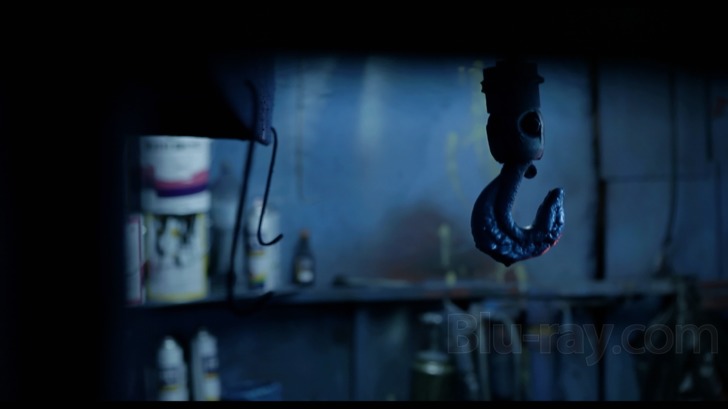
Whatever issues I might have with the film itself, there are no major problems with Drafthouse Films' 1080p, AVC-encoded Blu-ray. Like Graceland , Pieta was shot with largely handheld and easily portable DSLR cameras; the cinematographer was Jo Young-Jik, making his feature debut. The results, after post-processing on a digital intermediate, are sharp, detailed and vividly colorful, whether it's the varied shades of blue, gray and brown of the metal shops in Cheonggyecheon, or the reds that always seem to appear around Jang Mi-son, or the rainbow of colors in the lively districts of Seoul when the main characters venture outside their decaying environs. The image on Pieta suffers from the same flaw as the DSLR-originated image on Graceland, which is occasional aliasing on horizontal edges. The phenomenon is rare but noticeable when it appears.
Pieta Blu-ray Movie, Audio Quality 
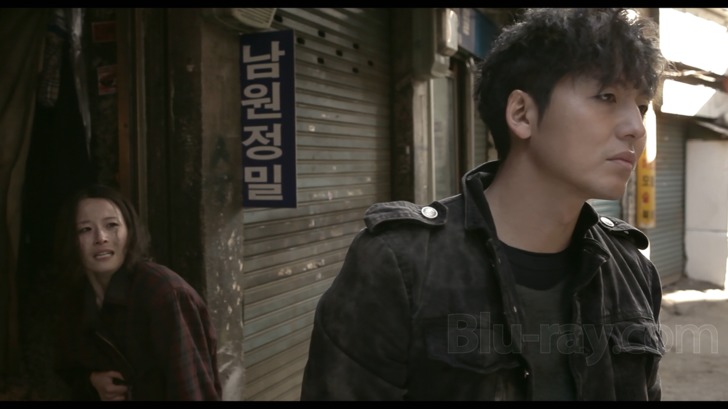
The machines of Cheonggyecheon—drills, metal punchers, saws and other assorted industrial devices—are the most notable presence on the lossless DTS-HD MA 5.1 track. They frequently drown out voices, or require the characters to shout over them. The track's full dynamic range conveys the hum, roar and whine of the various machines with conviction, whether nearby at full volume or in the distance. The sound effects associated with Lee Gang-do's collection activities (pounding on rattling metal, slaps, punches, etc.) are also powerfully conveyed. I cannot vouch for the clarity of the Korean dialogue, but cries, wails and howls of pain are piercing. The score by Park In-young is sparingly used and, for the most part, kept in the background. A Korean Dolby Digital 5.1 track is also included.
Pieta Blu-ray Movie, Special Features and Extras 
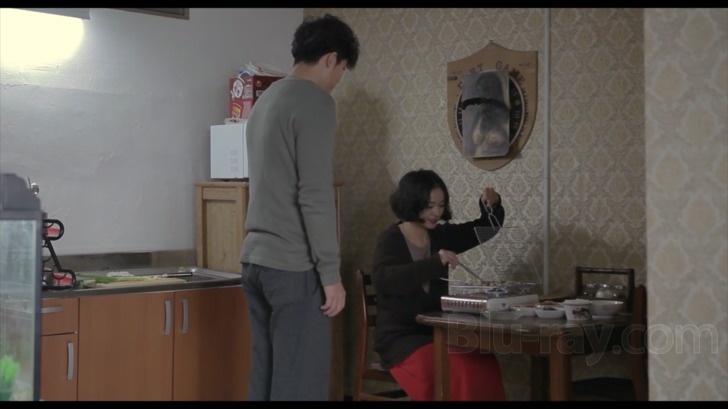
The back cover of the Blu-ray case lists an extra entitled "Winning the Golden Lion at the 69th Venice Film Festival". No such featurette appears on the disc. It's possible that the title was meant to apply to one of the featurettes listed below, but it was not obvious to me which one.
- Commentary with Director Kim Ki-duk and Actors Cho Min-soo and Lee Jung-sin: The commentary is in Korean with English subtitles. It's a frustrating commentary for anyone who doesn't speak Korean, because one has a sense that much more is being said than is contained in the subtitles. All three participants recall details of the shoot and the locations. The actors discuss their characters and performances, while Kim elaborates on thematic elements and plot points.
- God, Have Mercy on Us—Interviews with Kim Ki-duk, Cho Min-soo and Lee Jung-sin (480i; 1.85:1, non- enhanced; 12:56): These interviews appear to have been conducted during filming, because the actors are in costume and make-up. The focus of the interviews is on working together.
- Behind the Scenes Featurettes (480i; 1.85:1, non-enhanced; 5:23): Although the menu lists "featurettes" (plural), only one featurette is included. It begins with director Kim Ki-duk describing his first encounter with Michelangelo's sculpture during a visit to the Vatican, which inspired the story of the film. Cho Min-soo and Lee Jung-sin offer observations on their characters, with the benefit of having completed the experience of filming.
- Filmography of Kim Ki-duk (480i; 1.85:1, non-enhanced; 2:26): This is actually an additional featurette that serves as a promotional introduction to Pieta.
- Pieta Trailer (480i; 1.85:1, non-enhanced; 1:55)
- Trailers (1080p): Unlike Drafthouse's disc for Graceland, which included trailers for the full array of the studio's Blu-rays, the Blu-ray for Pieta omits the comedies and the grindhouse/exploitation films. It's an interesting choice.
- Bullhead
- The Ambassador
- Wake in Fright
- Wrong
- Graceland
- Drafthouse Alliance Stinger (this also plays at startup, where it can be skipped with the chapter forward button)
- Insert: A booklet is included with high-quality stills, credits for both the film and the disc, an opening statement by director Kim Ki-duk, and an informative Q&A with the director.
Pieta Blu-ray Movie, Overall Score and Recommendation 

For those already familiar with Pieta or with Kim Ki-duk's work in general, my negative reaction to Pieta will be of no consequence. Such viewers can rest assured that Drafthouse has created a first-rate presentation of the film. For those new to Kim's work, I suggest not beginning with Pieta, despite its claim to be a more "popular" and accessible work. Better to meet Kim on stronger ground, like the leisurely but winning Spring, Summer, Fall, Winter . . . and Spring than to get a first impression that is uncharacteristically grim and alienating. Caveat emptor.
Similar titles
Similar titles you might also like

Bullhead
Rundskop
2011

The Club
El Club
2015

The Conformist
Il Conformista | 4K Restoration
1970

Moebius
2013

Julieta
2016

Lady Vengeance
Sympathy for Lady Vengeance | Ultimate Revenge Edition | 친절한 금자씨
2005

Birds of Passage
Pájaros de verano
2018

The Banishment
Izgnanie
2007

Beanpole
Дылда / Dylda
2019

The Third Murder
三度目の殺人
2017

Sansho the Bailiff
山椒大夫 / Sanshô dayű
1954

Outrage
アウトレイジ / Way of the Yakuza
2010

Omar
2013

Bedevilled
2010

Elle
2016

The Attack
2012

Neon Bull
Boi Neon
2015

The Dance of Reality
La danza de la realidad
2013

Sympathy for Mr. Vengeance
Ultimate Revenge Edition
2002

Belladonna of Sadness 4K
1973